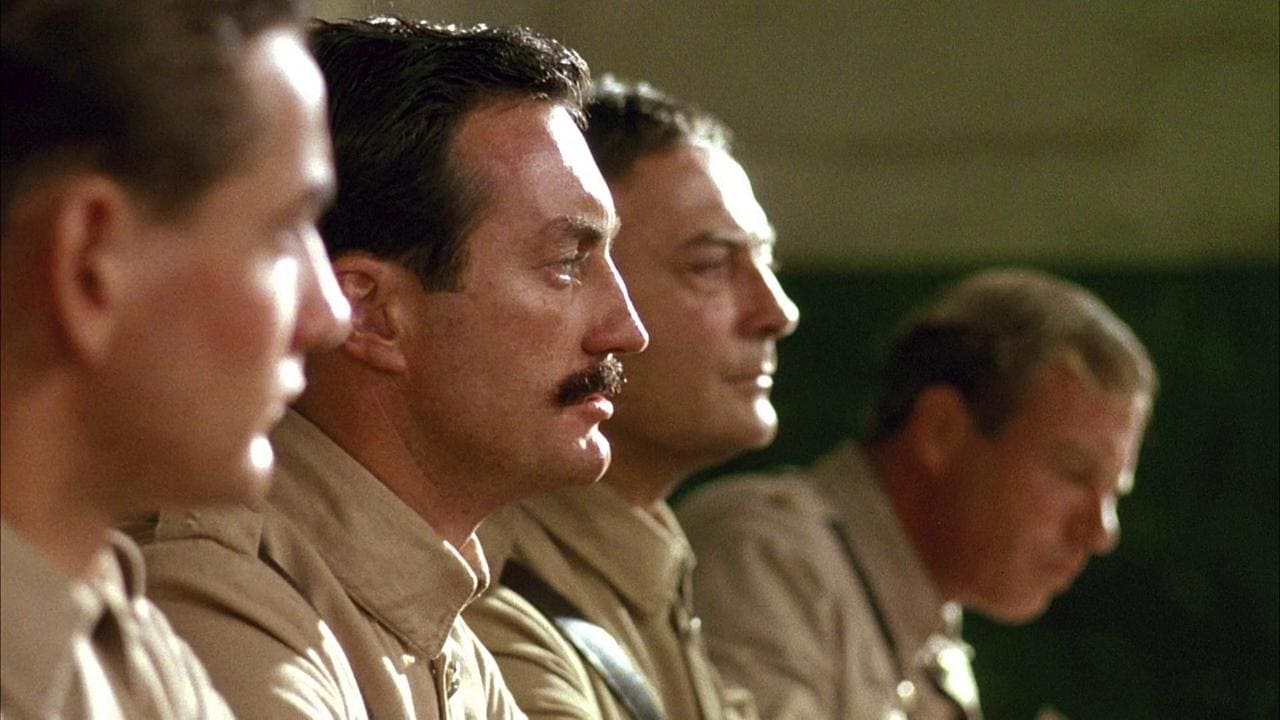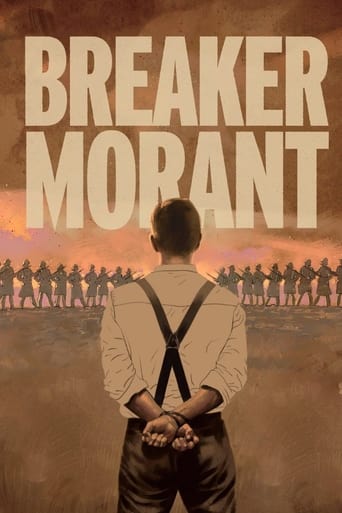



This is a tender, generous movie that likes its characters and presents them as real people, full of flaws and strengths.
View MoreIt’s fine. It's literally the definition of a fine movie. You’ve seen it before, you know every beat and outcome before the characters even do. Only question is how much escapism you’re looking for.
View MoreThere are moments that feel comical, some horrific, and some downright inspiring but the tonal shifts hardly matter as the end results come to a film that's perfect for this time.
View MoreVery good movie overall, highly recommended. Most of the negative reviews don't have any merit and are all pollitically based. Give this movie a chance at least, and it might give you a different perspective.
View MoreThis Australian movie, based on Kenneth G. Ross' play, gives a dramatic account of a true situation that occurred during the Boer War. I liked it for several reasons: 1) It is a good courtroom drama. 2) It gave me (an American) more insight into what the Boer War was about and how it was fought. 3) It gives insight into ill-defined wars and the consequences for the troops that are asked to fight them with sloppy rules of engagement. 4) It is one of the most powerful anti-war movies I have seen. 5) Like other movies about the British colonial period, it shows The Empire in the process of its fall. The reasons for the Boer War (1899-1902) were complex. But, it started near the end of Victoria's reign and ended during the reign of her son, Edward VII. The Boers (mainly Dutch) were fighting for their independence and the British were fighting to maintain control over the British Empire. The Boers did not fight 'fairly' and the British were, in the end, forced to use Australian irregulars, the Bushvelt Carbineers, to implement some of the Boer's civilian-clad commando tactics. For example, these commandos would often abuse the white flag of surrender to suck in the unsuspecting British, only to be killed at close range. As the movie begins in 1901, three Australian, officers from the Bushvelt Carbineers, Lt. Harry 'Breaker' Morant (Edward Woodward), Maj. J.F. Thomas (Jack Thompson) and Capt. Alfred Taylor (John Waters), are brought before a British court martial for executing prisoners and killing a German minister. Under the direction of Lord Horatio Kitchener (Alan Cassell), these three soldiers were set up as scapegoats for tactics that had been used by other soldiers, on both sides. Also, in executing their duties, all three seemed to have received direct orders from 'higher ups.' To add insult to injury, their defense council had NEVER tried a case in court and was brought into the case only one day before the case began. Yet in spite of all of this, he mounts an unexpectedly brilliant defense for his clients. In fact, at one point he calls Kitcherner, himself, into the courtroom to testify. However, Kitcherner sends one of his subordinates to the court marshal to lie under oath. Also, the judge assigned to the case continually makes clearly incorrect pronouncements in response to objection calls. The viewer is left with an overwhelming feeling of frustration. The purpose of this "kangaroo court martial" was to prevent the Germans from entering the war on the side of the Boers—no one wanted the late Queen's grandson, Kaiser Wilhelm II, to side with the Boers. The court martial also made an example of the three Australians to hasten a peace treaty and end the war between the Boers and the British--a mere side show of the war. I like the structure of this movie, it is related during the trial with flashbacks with show what actually happened and why. The acting is also superb. So far, this is the one of best British colonial movies I have ever seen!
View MoreIt's Petersburg, Transvaal, South Africa 1901. During the Boer War, three Australian lieutenants Harry Morant (Edward Woodward), Peter Handcock (Bryan Brown) and George Witton (Lewis Fitz-Gerald) are on trial for killing some Boer prisoners and a German missionary after their Capt. Hunt was killed. They are scapegoats and Lord Kitchener needs to convict them to appease the Germans. However they claim that they were following the rules of war laid down by Hunt which comes from the top Kitchener. It's a show trial where the judges are predisposed and the defense lawyer is inexperienced in military court. The Boer attack the prison and the three men heroically beat them back. The show trial goes on.This is not an anti-war movie. These guys are portrayed as heroes for much of the movie. This is more or less anti-British military. That's an easy target. These characters are complicated and I wish they are played just a little bit more complicated. They need to be a bit more brutal. During the Boer attack on the prison, they are more like Rambo. There is a fascinating but a little slow court procedural where the defense starts out strong and turns murky. The final defense closing arguments are awkward. It's a movie that leaves me questioning the need of the movie to make martyrs of these men.
View MoreThis movie concerns the atrocities and subsequent courts-martial of three Australian officers serving during the Boer War. Although the movie itself is quite dramatic I think it deserves mention that the defendants were all guilty of the crimes in which they were charged. The question then remains as to whether they were simply following orders or not. Yet even if they were under orders to "take no prisoners" it should also be stated that the acceptance of prisoners under a flag of truce (or any other circumstance) nullifies the order and therefore undermines any defense for executing them once they've been captured. Likewise the cold-blooded murder of a witness to the crime cannot be justified or overstated either. That being the case any implication that the three defendants were tried solely because of political considerations is rather specious. Be that as it may, as far as the movie is concerned it is still quite gripping and provocative from start to finish with good direction (Bruce Beresford) and crisp acting from all concerned. Having said that I believe it should be restated that the film itself is not an historical documentary and shouldn't be mistaken for one. Above average.
View MoreI've seen this movie at least 20 times and know every line before it is spoken. It is safe to say that it an all time favorite for me. The movie, based on a historical event, is strengthened a great deal by the quality of the cast. It's difficult to find many movies with a lineup from a talent standpoint at the top that bests Edward Woodward, Jack Thompson and Bryan Brown. The script is very well written and acted out, but as with many movies based on an actual event, they choose for whatever reason to not be totally historically accurate. That is, if Kit Denton's book about Morant, "The Breaker" is correct. In the movie, three Australian soldiers are court marshaled for murdering Boer prisoners and a German missionary. In Denton's book, he lists 4 soldiers as court marshaled for those alleged crimes as well as killing a Boer child. In the movie, they are acquitted of killing the missionary, but found guilty of murdering the prisoners, for which Morant and Handcock are executed and Witten sentenced to penal servitude for life. In Denton's book, they are acquitted for executing the prisoners and the child, and found guilty of killing the missionary, for which Morant and Handcock are executed and Witton sentenced to life in prison and Lt Ivor Compton Summers, cashiered. The Boer prisoner Visser was executed by a quickly formed firing squad in the movie. According to Denton's book, Morant shot Visser himself, after giving him a rifle and telling him to "shoot, God damn you to hell". As the simple minded Visser held out the rifle to return it, Morant stepped toward him and shot him in the face. The movie was never based on Denton's book, although it was said to be by the book's publisher at the time. It was based on a stage play by Kenneth Ross. I believe Denton is most historically correct, after reading his book, when it comes to the parts related to the events the movie is based on. Denton though, prefaces his book by saying that the British government's refusal to release a number of essential documents make it impossible to be completely accurate. Denton's book preceded the movie, and some of the lines in the movie were also in the book, although not spoken by the same person. The lines ending with "We shot them under rule 303" were spoken by Handcock in the book rather than Morant. The lines about "I wonder how more serious things could be" were not said by Handcock after being chastised for his verbal exchange with Drummond, but by Witton after he became upset with questions about interrogating of Jacob Hesse the missionary. Witton, according to Denton, was not the mild mannered and soft spoken person the movie made him out to be. That part of him was actually more like Ivor Summers. Witton was closer to Handcock in personality according to Denton. The lines in the movie being similar or the same as lines in the book lend me to believe Ross used Denton's book as a source of info to help write his play that later became the screenplay for the movie. I'd have liked to have seen the movie been actually based on Denton's book, although it was still one of my favorite movies the way it was. The event did take place, and while there are differences between the movie and Denton's book, it is good to see this travesty of justice not totally lost in history.
View More